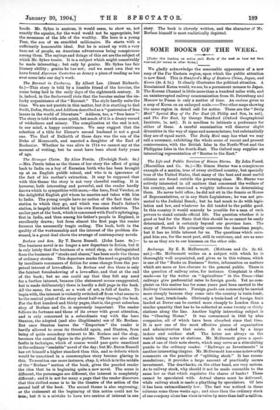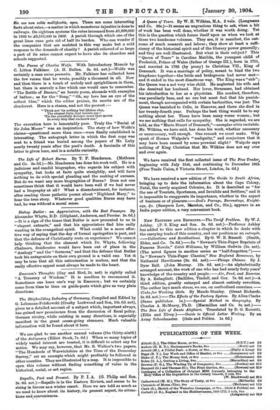Railways. By E. R. McDermott. (Methuen and Co. 2s. 61.
net.)—Mr. McDermott writes on a subject with which he is thoroughly well acquainted, and gives us in this volume, which is one of the "Books on Business" Series, information on matters which are more or less obscure to the general public. There is the question of railway rates, for instance. Complaint is often made—as by the writer on " Agriculture " in the Times—that railways give preferential rates to foreign goods. Yet no com- plaint on this matter has for some years past been carried to the Railway Commissioners. Foreign goods can commonly be carried more cheaply because they come into the country in train-loads, or, at least, truck-loads. Obviously a train-load of foreign fruit landed at Dover can be carried more cheaply to London than a similar quantity that has to be collected at some twenty or thirty stations along the line. Another highly interesting subject is the "Clearing House." It was commenced in 1842 by nine companies, all of which have been absorbed since that time. It is now one of the most effective pieces of organisation and administration that exists. It is worked by a large indoor and outdoor staff. The latter are always on the watch taking notes at stations. Mr. McDermott gives a speci- men of one of their note sheets, which may serve as a stimulating puzzle to the ordinary reader. "Railways as Investments" is another interesting chapter. Mr. McDermott has some noteworthy comments on the practice of "splitting stock." It has recom- mendations; it provides a large amount of practically secure investment. The drawbacks, on the other hand, are very serious. As to railway stock, why should it not be made amenable to the same law as that which regulates the shares of banks? These cannot be speculated with. Actual shares must be delivered, while railway stock is made a plaything by speculators. Of late it has been extraordinarily low. The fact was noticed in these columns some three weeks ago ; and since then the ordinary stock of one company alone has risen in value by more than half-a-icillion. Hic vos non vobis rael/ifieatis, apes. There are some interesting facts about rates,-a matter in which monstrous injustice is done to railways. On eighteen systems the rates increased from £1,868,000 in 1892 to £3,516,000 in 1902. A parish through which one of the great lines runs gets rid of half its burden. Who can wonder if the companies that are mulcted in this way make but a cold response to the demands of charity? A parish relieved of so large a part of its rates cannot expect to have also its churches and schools supported.























































 Previous page
Previous page